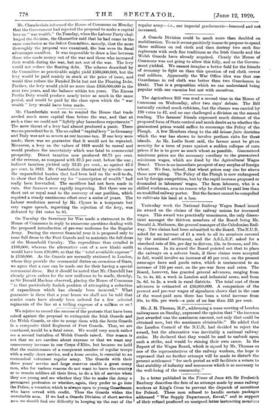The Agriculture •Bill was read a second time 'in the
House of Commons on Wednesday, after two days' debate. The Bill 'naturally excited much criticism, but the closure was carried by 190 votes to 42, and no one challenged a division on the second reading. The farmers' friends expressed much distrust of the proposed form of State control and much doubt as to whether the guaranteed prices would suffice to encourage the •Policy of the Plough. A few Members clung to the old kisser faire doctrine which the war has shown to involve perilous risks for these islands. As Mr. Leslie Scott said, the farmer must be given security for a term of years against a sudden, collapse of corn prices if he is to grow as much wheat as possible. Guaranteed minimum prices are the necessary corollary to the guaranteed minimum wages, which are fixed by the Agricultural Wages Board. There fano immediate prospect of any surplus of foreign wheat. 'We fear, indeed, that wheat prices may rise far above those now ruling. The Policy of the Plough is now endangered not by foreign competition, but by the rapid increase proposed or demanded in labourers' wages. The farm labourer, who is a skilled workman, sees no reason why he should be paid less.than an unskilled railway porter. But the farmer cannot be compelled to cultivate his land at a loss.






































 Previous page
Previous page